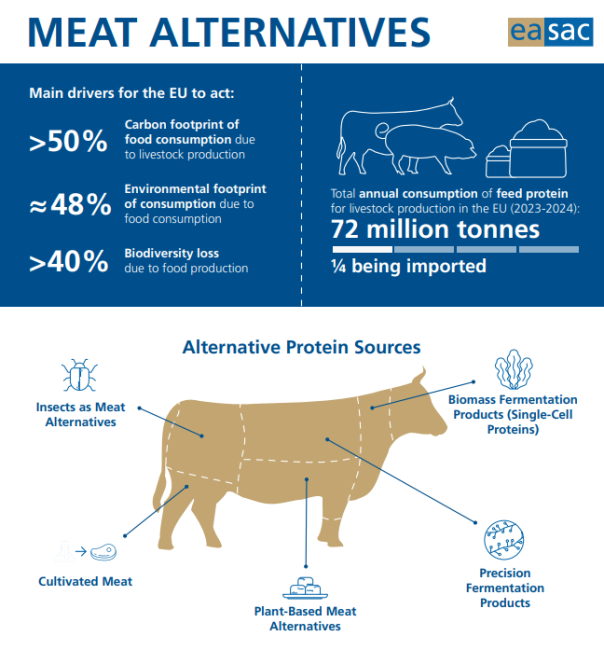
As the EU is mulling a protein strategy to bolster sustainable food systems, the report examines the fast-growing world of meat alternatives, from plant-based and insect-derived proteins to microbial fermentation and cultivated meat.
EASAC is formed by the national science academies of the EU Member States, Norway, Switzerland and United Kingdom, to collaborate in giving advice to European policymakers.
Through EASAC, the academies work together to provide independent, expert, evidence-based advice about the scientific aspects of European policies to those who make or influence policy within the European institutions.
Report on meat alternatives
The report offers policymakers a science-based roadmap for balancing climate commitments, public health, and food system resilience. However it suggests that policy frameworks are lagging scientific and technological developments.
Professor Bert Rima, chair of the working group composed of experts nominated by European science academies, said: “The EU needs to act now if it wants to stay ahead of the protein transition, ensure food security, and meet its climate and biodiversity goals.
“It should create policies that support innovation in meat alternatives while ensuring food safety and consumer protection. Europe’s future generations are likely to grow up with less meat on their plates - and that may be both necessary and beneficial. The report offers guidance to encourage people to eat less meat and to enable better choices.”
Environmental Gains
The analysis shows that several meat alternatives potentially have a lower environmental footprint than conventional meat, that insects and microbial fermentation provide efficient protein sources with minimal environmental impact when using sustainable feedstocks, and that cultivated meat could potentially offer sustainability benefits, if the process is powered by renewable energies.
Health and Nutrition
Alternatives can support balanced diets, but not all are equal: some processed plant-based products may contain excess salt and saturated fat. More data is needed on long-term impacts of newer products like cultivated meat and precision fermentation proteins.
Consumer Acceptance
Naturalness, taste, affordability, and clear labelling remain critical to consumer trust. Younger and urban populations are more open to alternatives, especially those concerned with animal welfare and climate change.
Hanna Tuomisto, professor of sustainable food systems and co-author, said: “Consumer trust can break easily - especially if products are overhyped or misleadingly labelled. We need full transparency, not just on the ingredients, but also on environmental impact and processing.
“Europe has the tools and the innovation power to lead globally. But we need more than just technological solutions. The social and political shaping of the transition to sustainable proteins will determine its success. Without coordinated action, we risk losing both environmental gains and public confidence.”
Innovation Needs Support
Fermentation and cultivated meat show high potential but face cost and scalability hurdles. Strategic public funding and policy clarity are needed to drive safe and sustainable innovation.
Six Urgent Calls to Policymakers
- Increase transparency and introduce clear, mandatory labelling standards on nutrition, processing, and environmental footprint.
- Establish clear policies and regulatory framework to guide the additions to plant-based and microbial protein products.
- Enhance environmental sustainability standards, for example comparability in life-cycle assessment, use of renewable energy, industrial and agricultural side streams.
- Strengthen consumer awareness with evidence-based recommendations on integrating meat alternatives into balanced diets and by combating misinformation.
- Create a positive framework for innovation by Investing in R&D, especially for safe and scalable alternatives like microbial and cultivated meat, and by helping livestock farmers adapt to changing markets for meat alternatives and alternative proteins.
- Consider ethical and societal questions, such as varying dietary needs, culture, traditions, and economic conditions. Attention must also be paid to ethical considerations in insect farming and ethical issues raised by cultivated meat relying on animal cells.